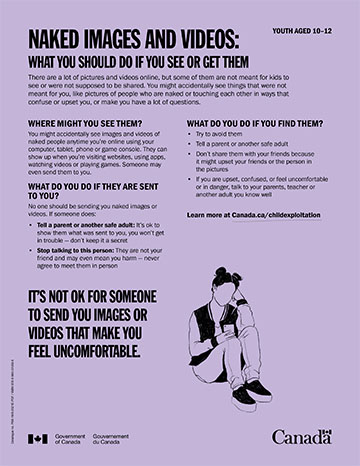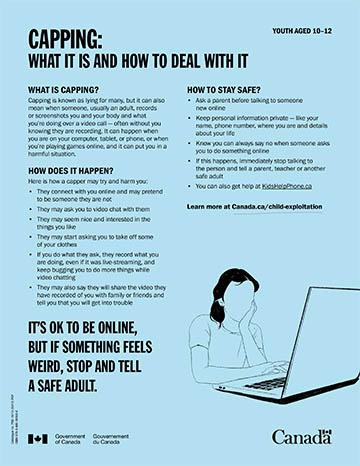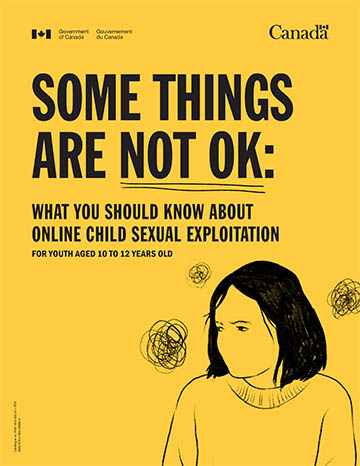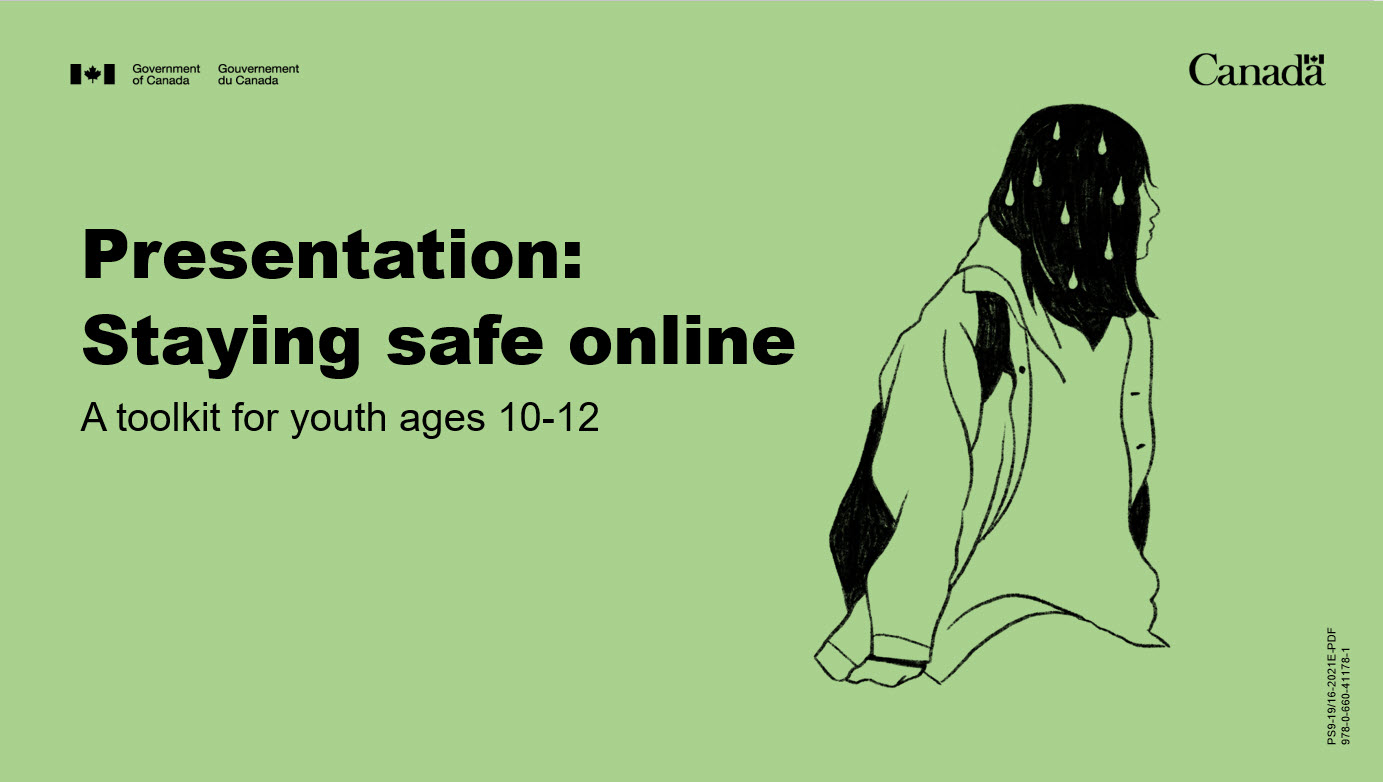Toolkit for youth aged 10-12
Get the materials you need to teach 10 to 12 year-olds about online child sexual exploitation, what to do if it happens to them or someone they know, how to make safe choices online, and where to go to get help or learn more. Topics covered include naked images and videos, and online grooming.
Fact sheets
One page handouts that cover individual topics, such as online grooming and naked images and videos.
Booklet
Handout that covers a range of topics over several pages.
Posters
8.5 x 11 and 11 x 17 posters discussing behaviours that are OK and not OK.
8.5 x 11 - Colour
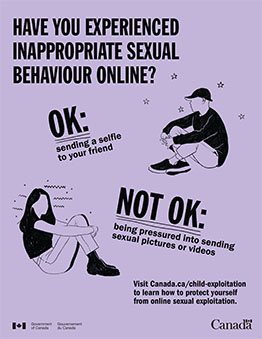
Text version
Have you experienced inappropriate sexual behaviour online?
OK: sending a selfie to your friend
NOT OK: being pressured into sending sexual pictures or videos
Visit Canada.ca/child-exploitation to learn how to protect yourself from online sexual exploitation.
8.5 x 11 - Black and White
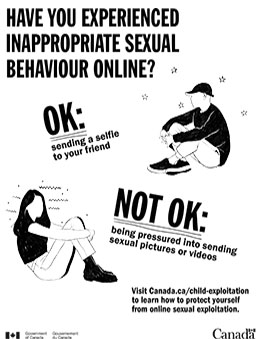
Text version
Have you experienced inappropriate sexual behaviour online?
OK: sending a selfie to your friend
NOT OK: being pressured into sending sexual pictures or videos
Visit Canada.ca/child-exploitation to learn how to protect yourself from online sexual exploitation.
11 x 17 - Colour
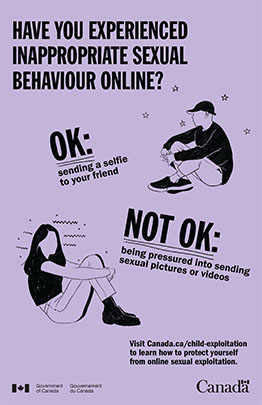
Text version
Have you experienced inappropriate sexual behaviour online?
OK: sending a selfie to your friend
NOT OK: being pressured into sending sexual pictures or videos
Visit Canada.ca/child-exploitation to learn how to protect yourself from online sexual exploitation.
11 x 17 - Black and White
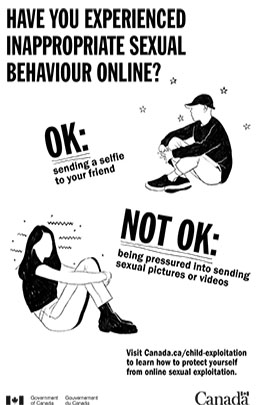
Text version
Have you experienced inappropriate sexual behaviour online?
OK: sending a selfie to your friend
NOT OK: being pressured into sending sexual pictures or videos
Visit Canada.ca/child-exploitation to learn how to protect yourself from online sexual exploitation.
Presentation
A fully designed PowerPoint lesson with pre-written speakers notes.
Videos
A series of animated videos that introduce the various topics of online child sexual exploitation and give high-level advice.
Naked images and videos
Transcript
When you spend time online, you may come across images or videos of people without clothes on or people having sex.
It's natural to be curious about sex, but being exposed to these images and videos can give you the wrong idea about things like healthy relationships, sexuality, consent, and your own body.
If you do see them, or if they are shared with you, don't pass them on to others — even your friends. They may not want to see them, and it could confuse or upset them.
And if they weren't shared with consent, you can also end up hurting the person shown in the images and videos. Non-consensual sharing of these images and videos can even be illegal.
Whatever happens, remember that you are not alone. Help is available @ KidsHelpPhone.ca.
[On-screen: Learn more at Canada.ca/child-exploitation]
Capping
Transcript
Have you heard of capping?
To many people, capping means lying, but it can also mean when someone approaches you online, asks you to video chat and then tricks or threatens you into doing things like taking your clothes off in front of the camera. The person (ALT capper), usually an adult pretending to be someone else, will record or screenshot what you do — often without you knowing
Capping can happen quickly and it can put you in a harmful situation.
These people often share the pictures and videos they take with others online. Once they're shared, it can be hard to control what happens to them or get them removed.
All of this can be very upsetting and could cause a lot of harm.
When you spend time online, know that people are not always who they say they are.
Whatever happens, remember that you are not alone. Help is available – report to CyberTip.ca or visti Kids Help Phone.ca
[On-screen: Learn more at Canada.ca/child-exploitation]
Online grooming
Transcript
If you spend time online, there are some things you need to be aware of — such as grooming.
That's when someone acts like your friend, girlfriend or boyfriend to try and get you to do what they want — like talk about sex or send videos or pictures of yourself without clothes on. Whether you know the person in real life or not, that is not OK. Sometimes, grooming can take place over a long period of time, over multiple conversations. It can happen on social media, chats, games, live-streaming apps, or anywhere else you talk to people online. It can put you in a harmful situation.
This can be confusing because when you first meet someone online, it may seem like you can trust them. They might be super friendly and compliment you or give you things. Remember, some people might lie about their age or pretend to be someone else — all to get you to trust them.
But these people are not safe. Once they have your trust, they will try to trick, confuse or pressure you into doing what they want. They will try to gain control over you through things like embarrassment, threats or making you feel stuck.
If you're in this type of situation, know that it's not your fault and it's OK to speak up.
Whatever happens, remember that you are not alone. Help is available – report to CyberTip.ca or visit Kids Help Phone.ca
[On-screen: Learn more at Canada.ca/child-exploitation]

